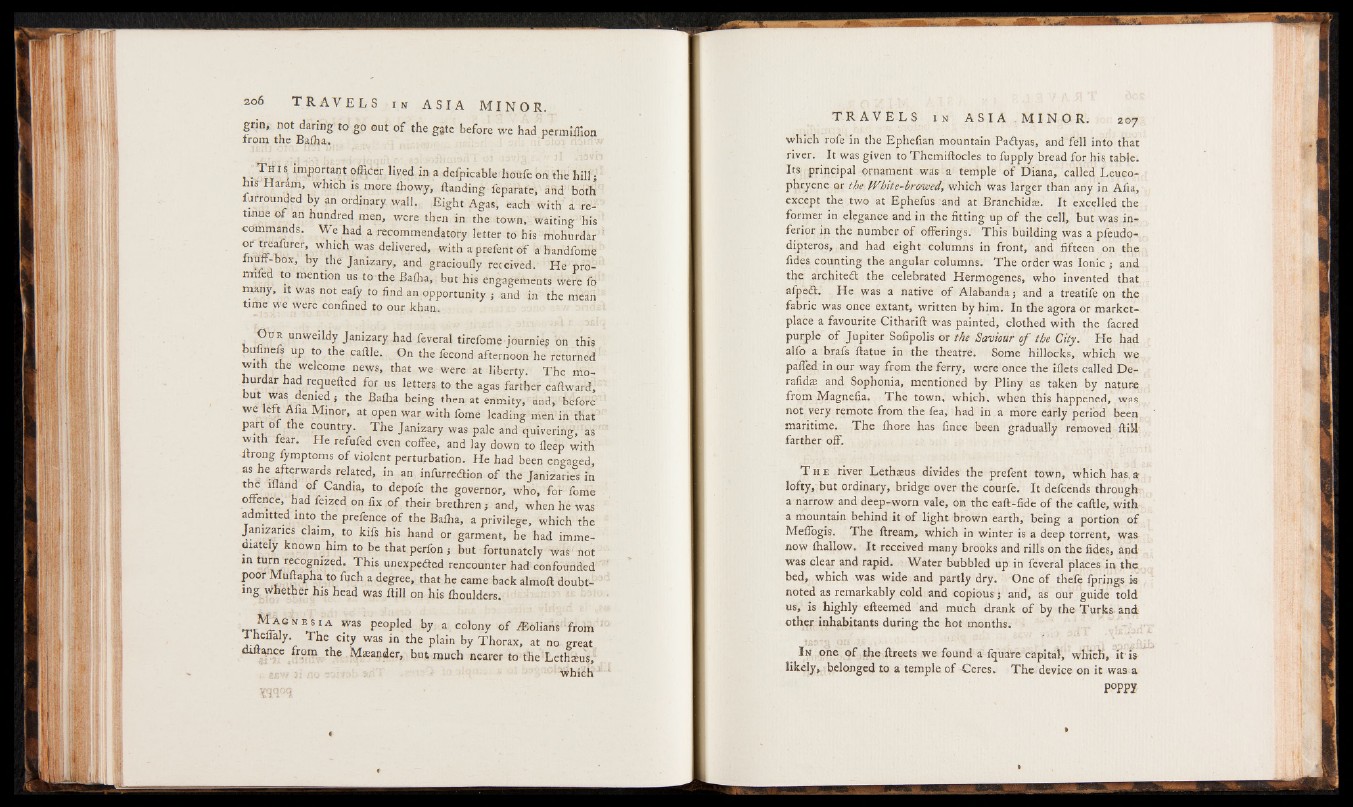
grin, not daring to go out of the gate before we had permiffion
from the Baffia. 1
T l u V mPortant officer lived in a defpicable houfe on the hill ;
his Haram which is more fhowy, {landing feparate, and both
furrounded by an ordinary wall. Eight Agas, each with ' a retinue
of an hundred men, were then in the town, waiting his
commands. We had a recommendatory letter to his mohurdar
7 c UrCf! Wh,ich was delivered, with aprefent of a handfome
inuff-box, by the Janizary, and gracioufly received. He pro-
rmfed to mention us to the Baffia, but his engagements were fo
many, it was not eafy to find an opportunity ; and in the mean
time we were confined to our khan.
Our unweildy Janizary had feveral tirefome journie# on this
bufinef^ up to the caftle. On the fecond afternoon he returned
with the welcome news, that we were at liberty. The mohurdar
had requefted for us letters to the agas farther eaftward,
but was denied j the Baffia being then at enmity, and, before
we left Afia Minor, at open war with fome leading men in that
part of the country. The Janizary was pale and quivering, as
with fear. He refufed even coffee, and lay down to fleep with
Jtrong fymptoms of violent perturbation. He had been engaged,
af i le.^“ e.rwards reIated> in an infurreftion of the Janizaries in
the ifland of Candia, to depofe the governor, who, for fome
offence, had feized on fix,of their brethren; and, when he was
admitted into the prefence of the Baffia, a privilege, which the
Janizaries claim, to kifs his hand or garment, he had immediately
known him to be that perfon ; but fortunately was1 not
in turn recognized. This unexpected rencounter had confounded
poor Muftapha to ffich a degree, that he came back almoft doubting
-Whether his head was Hill on his ffioulders.
M ag n e j^ a was peopled by, a colony of ^Eolians from
ihelialy. The city was in the plain by Thorax, at no great
diftance from the Meander, but much nearer to the Lethams,
which '
which rofe in the Ephefian mountain PaCtyas, and fell into that
river. It was given to Themiftocles to fupply bread for his table.
Its. principal ornament was a temple of Diana, called Leuco-
phryene or the White-browed, which was larger than any in Afia,
except the two at Ephefus and at Branchidas. It excelled the
former in elegance and in the fitting up of the cell, but was in^
ferior in the number of offerings. This building was a pfeudo-
dipteros, and had eight columns in front, and fifteen on the
fides counting the angular columns. The order was Ionic ; and
the architect the celebrated Hermogenes, who invented that
afpeCt. He was a native of Alabanda j and a treatife on the
fabric was once extant, written by him. In the agora or marketplace
a favourite Citharift was painted, clothed with the facred
purple of Jupiter Sofipolis or the Saviour of the City. He had
alfo a brafs ftatue in the theatre. Some hillocks, which we
paffed in our way from the ferry, were once the iflets called De-
rafidas and Sophonia, mentioned by Pliny as taken by nature
from Magnefia. The town, which, when this happened, was
not very remote from the fea, had in a more early period been
maritime. The ffiore has fince been gradually removed ftiJI
farther off.
T he river Lethasus divides the prefent town, which has, a
lofty, but ordinary, bridge over the courfe. It defcends through
a narrow and deep-worn vale, on the eaft-fide of the caftle, with
a mountain behind it of light brown earth, being a portion of
Meffogis. The ftream, which in winter is a deep torrent, was
now ffiallow. It received many brooks and rills on the fides, and
was clear and rapid. Water bubbled up in feveral places in the
bed, which was wide and partly dry. One of thefe fprings is
noted as remarkably cold and copious; and, as our guide told
us, is highly efteemed and much drank of by the Turks and
other inhabitants during the hot months.
In one of the ftreets we found a fqua're capital', whieh, i t is
likely, belonged to a temple of Ceres- The device on it was a
poppy